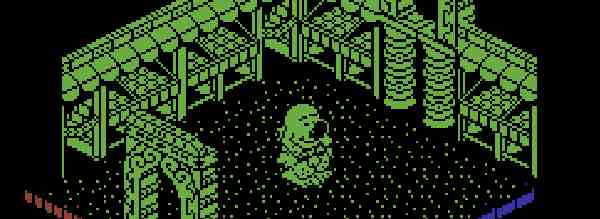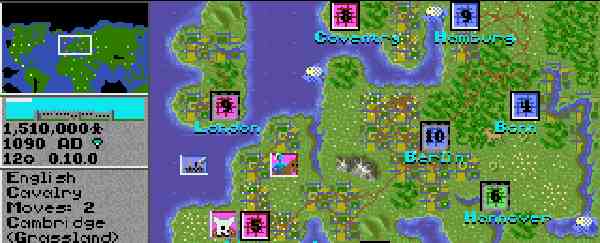Gaming Made Me: Mathew Kumarked These Highly
To be frank (don't worry, you can still be Shirley) the first thing that disturbs me about writing about how gaming made me is that so many of you reading this won't be old enough to remember going into a John Menzies and browsing the racks and racks of games between £1.99 and £2.99, buying one almost certainly on the basis of how interesting the cover was (or sometimes how many games they'd managed to crush on; Codesmasters sticking four, usually terrible, games on some of their tapes got me more than once) and then going home and waiting for the tape to load while reading the insert.
Good lord, so few of you will remember running down to the newsagents, back when newsagents were observably owned by a bloke or a family and weren't "convenience stores" with bright lighting and dirty magazines with blue wrappers so you can't see the boobies; running down to the newsagents with the crappy wood panelling and boxes of fingered-too-many-times sweets because it wasn't good enough to be one of the shops with the glorious rows of jars behind the counter (just fags at this one); running down to the newsagents to get the latest issue of Your Sinclair or Zzap or Amstrad Action to obsess over not even the games but the writing, somehow; obsess over how Linda Barker or Gary Penn or Frank O' Connor or Jonathan Nash (oh god, Jonathan Nash) managed to thrill and make us laugh by writing about bloody games.
Bloody crappy games, honestly. It's nice to go back and be nostalgic, but when talking about how gaming made me, it's remarkable to remember how long I spent playing games that weren't any good on my beloved Amstrad CPC (oh, how I loved you; how I still regret selling you for £30 to a family with some young kids so they could have their attention captured by the Play School disks we bought for my brother.)
Even the ones which were good—brillo conversions of Chase H.Q., Smash T.V. and Gryzor, for example—don't really stand up in this day and age, where we can play the originals on our PCs with some jiggery-pokery.
So I'll just talk about the one which I remember that transcends.

Head over Heels (Ritman/Drummond/Stevens)
There's a lovely PC remake of this, so I can get away with it, I think. Head over Heels is the first game that I can remember that I actually cared about. There were isometric adventure games before, and I had played them, never quite gelling with the forever slightly clumsy diagonal movement (my CPC came with Spindizzy, for example, which many remember fondly) but here, finally, was a game with proper character; a pair of characters, in fact. The titular Head and Heels. Trapped in their separate prison cells, our initial task is—quite simply—to reunite them.
It's surprising to read that so many years later Ritman claims to have made the story up in ten minutes (well, according to Wikipedia, anyway) because he's forgetting that what made Head over Heels so charming—still charming—was that it sublimely recognized the importance of strong characterization through not only art but design (Head can carry stuff and jump high; we surmise he's the brains of the operation. Heels runs fast; so he's muscle) and the pacing. That our initial goal to unite Head and Heels is so superbly rewarded with their combined powers, and our new quest opens up several worlds in which we'll be forced to use Head and Heels powers together and, in moments of wonderful risk, separately, is a work of wonder recognisable even by my 8-9 year old self.
In fact, I'd be hard pushed to argue that there hasn't been a game since that has used the multiple protagonists with separate skills quite as well. I can't think of one, anyway.
Wolfenstein 3.D (id)
Indiana Jones and the Fate of Atlantis (Lucasarts)
A strange pairing, but they are forever linked in my mind. As my Amstrad CPC entered its twilight years and my Game Boy—gorgeous cream brick that it was—didn't satisfy all of my needs, I began to look for a replacement. I scoured the magazines, returning to a comparison article in Games-X (of all things!) comparing the latest systems. I whittled it down. Obviously I was going to get the just-released Super NES or an Amiga.
(Worth noting that my decision to get either—for a few years at least—didn't preclude me loving Amiga Power and Super Play, the same way I loved Your Sinclair. Did I mention I love games writing, so much I'd read it without owning the system? Really I should be writing an article about how games writing made me.)
My father didn't like either of the options I put to him. A Super NES, after all, was just a toy. And to him, an Amiga was yesterday's technology (remember, this is '92—I held onto my Amstrad a LONG time.) He decided we were going to get a PC.
There's a strange thing he did here, though, something I remember well because he didn't just make the decision. He convinced me it was the right thing to do, which in retrospect was a pleasing thing—to have respected my opinion enough to know he had to make me see why he was making the right decision. (Thanks, Dad.)
He took me round to the house of a friend of his. They had kids a few years older than me, and he asked them to show me their PC. They booted up the newest game they had. Wolfenstein 3.D.
Often I've wondered about what would happen if we pulled someone from even just twenty years ago and showed them one of the current batch of games. I wonder, because I imagine the sound of their popping synapses would snap me right back to the moment I saw Wolfenstein 3.D.
The colours!
The smooth, 3.D. movement!
The murder of history's favourite villain, the Nazis, and their dogs, who really didn't know any better!
My father could have walked me right out of the room there and then and I'd have sold one of my feet for a PC. But they went one better and booted up their other new game—Indiana Jones and the Fate of Atlantis.
Now, I'd heard of the LucasArts games, and they were one of the reasons I was thinking Amiga, even with all that disk swapping. But again, the colours got me. You have to understand how amazingly well LucasArts had learned to use the 256-colour VGA palette. This wasn't the sprite and backgrounds of the SNES; it was a moving painting to my eyes. The opening of Fate of Atlantis was as scene setting as anything I'd ever seen, the kind of amazing storytelling that astonished me was even possible
A few months later, I'd be sitting at the dining room table in front of a brand-spanking new 386, loading up copies of the very games I'd been shown. The crafty so-and-so, I realized; my dad had wanted a PC because he knew how easy it would be to keep me entertained with games he'd copied off his friend's PCs.
I showed him, though—I own a boxed copy of every PC game I've ever loved.
It's probably strange that this comes next. It's the least flashy title that you could ever imagine an eleven year-old being enthralled by. And I was no precocious nerd by that point, either; history was as foreign to me as it was to your average kid.
Like the rest of my early PC games, this came in an envelope in the form of a scribbled on 3.5'' floppy, but surprisingly it came with a full photocopy of the manual (sorry to everyone entirely disgusted by my early history of piracy, here.)
Clearly, the game wasn't intended for me. It was intended for my Dad to play, as the—my memory says German, for some reason—German bloke who had scribbled on the disk had included a note about how great it was.
My dad, a card shark, not a gamer, had no interest. It was passed to me and I booted it up.
There are a lot of flaws to the original Civilization, but the power that lies in the game is how incredibly cleverly it can "scale" with the player thanks to the bedrock of a very board game-esque world in which the rules are everything and in which each turn you can enjoy progress at your own speed.
When I started playing Civilization, eleven-years old and no idea what a Phalanx was, I'd start my Civilization with one city as soon as possible. I'd then sit there and make that city as glorious as possible. I'd barely scout. I'd barely involve in diplomacy. I'd start no wars.
I was a little, one city nation in which everyone was thrilled to live; a city overflowing with wonders (I was playing on the easiest difficulty) and constant progress.
One day, sitting in school, I realized all I was thinking about was my little civilization. Was I going to put more money into taxes to pay off the next wonder, or was I going to make people happier? I was doing little bits of math and wondering about historical facts and figures (I poured over the Civilopedia) during the very time I was supposed to be doing a lot of proper maths and learning about historical facts and figures (which I absolutely hated doing, paradoxically.)
I was addicted to a video game. Addicted. I kept playing, learning to scout, learning when to be diplomatic and when to fight, learning to irrigate, learning to build a civilization of tens of wonderful happy cities with connected road networks and a fine army. I bumped the difficulty up until I realized the computer was a cheating bastard.
It would be easy to say I lost interest there. But just because Civilization was over—an addiction that would flare again with Civilization II—the fact that video games were my life was solidified. If I wasn't spending all my time thinking about Civilization, I was spending all my time thinking about Ultima VII. Then Sam and Max, or Wing Commander, or, Alone in the Dark, Syndicate, Baldurs Gate, Fallout, Deus Ex and more and more and more until I'm here now today writing this in front of my PC. In my pants. I'm here because I loved video games so much—loved playing them and love reading about them and then writing about them—that love them, play them, read about them, and write about them, is what I do.
Thanks, games. I don't know if you made me or ruined me, but I'm happy either way.



